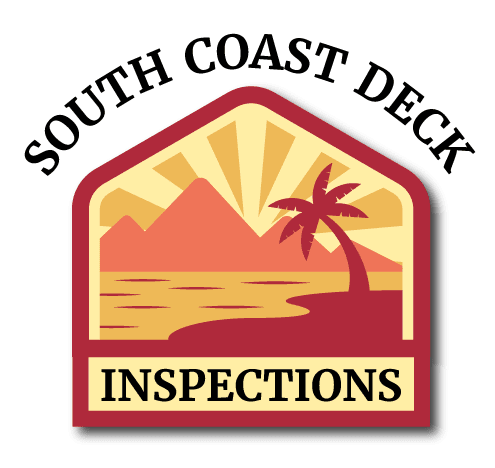Serving all of Southern California
We assist our clients in achieving compliance with the January 1, 2026 inspection deadline. Our inspections encompass SB 326 and SB 721 certifications for multifamily load-bearing wooden decks, staircases, balconies, walkways, and exteriors in the South Coast region of California including Imperial, Kern, Los Angeles, Orange, Riverside, San Bernardino, San Diego, Santa Barbara, San Luis Obispo and Ventura counties. Click here for our deck inspection service map.
As of January 1, 2026 – all of our inspection reports are compliant with new state law SB 410. Learn more about this new compliance for community associations and unit owners by reading about SB 410 Condominium Association Deck and Balcony Inspection Guidelines
HOA’s and California SB 326
Inspection deadline 01 January 2026. California State Bill 326 is much like California State Bill 721. Both are aimed at safeguarding individuals who utilize exterior elevated structures like decks and balconies. This legislation mandates that property owners conduct routine inspections on these structures. Ensuring no Elevated Exterior Element poses an immediate hazard to the safety of the occupants. Check out our latest article Navigating SB 326: A Comprehensive Guide for Home Owners Associations
Background: Senate Bill 326 & 721
These two Bills were initiated in response to the tragic balcony collapse in Berkely, CA on June 15, 2015. On this day an apartment building balcony collapsed during a birthday party attended by students, killing six of the 13 people who fell from the fourth-floor structure. The collapse has been found to be caused by “dry rot damage which had occurred along the top of the cantilever balcony deck joists” according to report. Click here to learn more…
Apartments and California SB 721
Inspection deadline 01 January 2026. California State Bill 721 is aimed at safeguarding individuals who utilize exterior elevated structures like decks, walkways, and balconies. This legislation mandates that property owners conduct routine inspections on these structures. Ensuring no Elevated Exterior Element poses an immediate hazard to the safety of the occupants. Check out our latest article Navigating SB 721: A Comprehensive Guide for California Apartment Owners.
California Balcony Inspections – SB 326 & SB 721 Compliance
Getting an Inspection Report is Easy
We understand the difficulties that come with owning and managing properties, whether it’s just one or many. With the addition of SB-326 & SB-721 laws addressing wood decks, stairs, walkways, and other elevated exterior elements, the challenges have only increased. These features are particularly vulnerable to the elements, demanding robust waterproofing and structural integrity. Please take a moment to review our comprehensive inspection guidelines provided here and allow us to support you in maintaining your properties by requesting a proposal.

What are the Differences Between SB 326 & SB 721?
HOA's & Condo's are covered by California State Law SB-326
Apartments & Commercial buildings are covered by California State Law SB-721
California SB721 mandates that buildings with three or more dwelling units undergo regular inspections of their Exterior Elevated Elements. If you own or manage a building with three or more units, your first inspection must be completed by January 1, 2025. This initial inspection sets the foundation for ongoing safety assessments. After the initial inspection, you must continue to inspect these elements at least once every six years. This periodic assessment ensures that any potential issues are identified and addressed in a timely manner.
What is the scope of application for California Law SB-326 and SB-721?
SB-326 Applies to Homeowners Associations HOA’s addressing balcony safety and structural integrity of the balconies, wooden stairs, and elevated exterior elements constructed from wood over six feet from the ground. SB-721 Applies to apartment buildings with three or more units, focusing on structural integrity of the balconies, wooden stair, and elevated exterior elements made of wood over six feet from the ground.
What is the purpose of California Law SB-326 and SB-721?
SB-326 HOA law addresses balcony safety by ensuring the structural integrity of balconies, walkways, wood stairs, landings and EEE’s over six feet from the ground. SB- 721 apartments focus on building inspections to ensure overall building safety and integrity of the wood elevated wood structures over six feet off the ground.
What is the primary concern addressed by California Law SB-326 and SB-721?
SB-326 primarily addresses the safety and structural integrity of balconies in buildings governed by homeowners’ associations (HOAs) and condominiums. In contrast, SB-721 primarily focuses on the safety and maintenance of buildings, including apartments and commercial structures, through regular inspections and adherence to certain standards.
What are the inspection requirements under California Law SB-326 and SB-721?
SB-326 HOA requires periodic inspections of balconies in buildings governed by homeowners’ associations HOA’s. These inspections must be conducted by qualified inspectors to ensure the structural integrity and safety of balconies. Inspections are mandated to be carried out every nine years for buildings with elevated exterior elements. Distinctly, SB-721 Apartments requires periodic inspections of the entire building, including common areas and individual units, in apartments and commercial buildings. Inspections must be conducted by qualified inspectors to assess the overall safety and maintenance of the building. Inspections are required every six years for buildings with three or more units.
How often are inspections required under California Law SB-326 and SB-721?
SB-326 HOA’s Every 9 years for buildings elevated exterior elements EEE’s. SB-721 Apartments Every 6 years for buildings with three or more units with EEE’s.
What are the qualifications for inspectors under California Law SB-326 and SB- 721?
2. SB-721 Apartments inspectors must be qualified professionals with the expertise and knowledge required to conduct thorough building inspections. The law may outline specific qualifications or certifications that inspectors must hold to assess building safety and maintenance effectively. In both cases, the qualifications aim to ensure that inspectors have the necessary skills and knowledge to identify potential safety hazards and ensure compliance with the relevant regulations.
What are the reporting and repair requirements under California Law SB-326 and SB-721?
SB-326 HOA mandates that any unsafe conditions or necessary repairs identified during balcony inspections must be reported promptly. Requires homeowners’ associations HOA’s and condominium boards to take appropriate action to address reported safety concerns and conduct necessary repairs to ensure the structural integrity of balconies. The law emphasizes the importance of timely reporting and repair to mitigate potential risks to residents’ safety. Instead, SB-721 Apartments requires that any unsafe conditions identified during building inspections must be reported promptly to the building owner or management.
Mandates that building owners or management take immediate action to address reported safety concerns and conduct necessary repairs to ensure the overall safety and maintenance of the building. The law emphasizes the importance of proactive maintenance and timely repair to safeguard the well-being of residents and occupants of commercial buildings.
How is non-compliance enforced under California Law SB-326 and SB-721?
SB-326 HOA non-compliance with balcony inspection requirements may result in penalties imposed by regulatory authorities. Homeowners’ associations (HOAs) and condominium boards failing to conduct required inspections or address identified safety concerns may face fines or legal action. The law may specify the nature and extent of penalties for non-compliance to incentivize adherence to inspection and repair requirements. In contrast, SB-721 Apartments non-compliance with building inspection requirements may lead to penalties enforced by regulatory agencies or local authorities. Building owners or management failing to conduct mandated inspections or address identified safety issues may be subject to fines, citations, or legal proceedings. The law may outline specific penalties for non-compliance to ensure accountability and encourage adherence to building safety regulations.
In both cases, enforcement measures aim to ensure that buildings comply with inspection and maintenance requirements to safeguard the safety and well-being of occupants and the public.
What are the disclosure requirements to residents under California Law SB-326 & SB-721?
Residents must be informed about any findings related to the structural integrity and safety of balconies, including any identified hazards or necessary repairs. The purpose of disclosure is to ensure transparency and keep residents informed about the condition of balconies in their buildings, allowing them to take appropriate precautions.
2. SB-721 Apartments requires building owners or management to disclose the results of building inspections to residents. Residents must be informed about any safety concerns or maintenance issues identified during inspections, along with details regarding planned repairs or corrective actions. The goal of disclosure is to promote transparency and empower residents to make informed decisions about their safety and well-being within the building.
In both cases, disclosure requirements aim to provide residents with essential information about the safety status of their living or working environment, enabling them to take necessary precautions and participate in the maintenance and upkeep of the property.
How are repairs funded under California Law SB-326 and SB-721?
Typically, the cost of repairs to balconies is covered by the HOA’s reserve funds or through special assessments levied on homeowners within the association. The law may outline specific procedures for allocating funds, determining the responsibility of individual homeowners, and prioritizing repairs based on the severity of safety concerns.
SB-721 Apartments does not specify provisions for funding repairs directly. The responsibility for funding repairs to address safety concerns identified during building inspections typically falls on the building owner or management entity. Building owners may use various means to finance repairs, including allocating funds from operating budgets, obtaining financing, or passing repair costs on to tenants through lease agreements.
When did California Law SB-326 and SB-721 become effective?
SB 721 Apartments: Effective January 1, 2019.
What additional provisions are included in California Law SB-326 and SB-721?
SB-326 Inspections and the qualifications of inspectors. Requires HOA’s and condominium boards to establish procedures for conducting inspections, reporting findings, and addressing safety concerns. May include provisions for notifying homeowners and residents about upcoming inspections and providing access to inspection reports. Differently, SB-721 Apartments focuses on building inspection timelines and qualifications, establishing requirements for the frequency and scope of inspections. Sets standards for the qualifications and expertise of inspectors conducting building inspections to ensure thorough evaluations of safety and maintenance. May include provisions for documenting inspection findings, reporting to regulatory agencies, and addressing any identified safety hazards promptly.
Your content goes here. Edit or remove this text inline or in the module Content settings. You can also style every aspect of this content in the module Design settings and even apply custom CSS to this text in the module Advanced settings. Your content goes here. Edit or remove this text inline or in the module Content settings. You can also style every aspect of this content in the module Design settings and even apply custom CSS to this text in the module Advanced settings. CSS to this text in the module Advanced settings.
